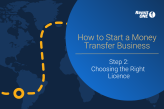How to Start a Money Transfer Business: Choosing the right licence February 21, 2023

Authored by Ibrahim Muhammad, Senior Consultant at RemitONE
Ibrahim Muhammad is a highly passionate payments professional with over 20 years of experience in Money Transfers and provides specialized consultancy to start-ups and incumbents.
In this next article in our ‘How to Start a Money Transfer Business’ series, we will be focusing on the licensing options available for Money Service Businesses (MSBs). In the first article, we spoke about the three key elements – the ‘Why, How and What’ of getting started with your own Money Service Business. In this article, we will provide you with useful information and guidance on the various licensing types applicable for MSBs with the UK as the chosen jurisdiction.
Every MSB is bound to comply with all the relevant bodies that are shown below to operate their business:
| Entity | Role | Areas |
| Companies House | Official Registrar of all companies that need to be set up in the UK | Entity Registration, Corporate filings |
| Financial Conduct Authority (FCA) | The conduct regulatory for financial services and markets | Payment Services Regulations, Electronic Money Regulations |
| Her Majesty Revenue and Customs (HMRC) | The Revenue, Tax Collections and AML Supervision | AML registration, Money Laundering Regulations |
| Information Commissioner’s Office | Independent authority setup to upload information rights | Data Protection Act, Data Privacy, Registry of all entities handling data |
| National Crime Agency | Law enforcement body | Crime investigation, Suspicious Activity Reporting |
Registering your Company
The first step for any MSB is to establish and register the company with Companies House. Information such as company name, details of appointed directors, and shareholders, as well as information about corporate structure needs to be provided in order to complete the registration process. The applicant can either do it on their own online using the Companies House website or avail the expertise of company formation agents/accountants to set up the company. Upon successful registration of the company, the company is then allocated the Company Number that uniquely identifies the company.
If the applicant decides to launch a money remittance business in the UK directly and not as an agent of any other licensed payment institution, then it is important that it applies for the relevant license with the FCA as shown below:
Small Payment Institution (SPI)
| Description | This type of license is applicable to those companies that are willing to provide money remittance services in the UK but with restrictions, such as an average monthly cap on the volume of transactions. |
| Prerequisites | – The company needs to have its principal place of business or trading office in the UK (registered with Companies House). – The company needs to appoint a director and MLRO who have the relevant experience and knowledge to run the business. – The company needs to meet all the guidelines stated under the Payment Services Regulations as well as the Money Laundering Regulations. |
Authorised Payment Institution (API)
| Description | This type of license is applicable to companies that are willing to provide money remittance services with no restrictions on the monthly volume of transactions. Prior to BREXIT, this type of licensing could also be passported across all member EU states. |
| Prerequisites | – The company needs to have its principal place of business or trading office in the UK (registered with Companies House). – The company needs to appoint a director and MLRO who have the relevant experience and knowledge to run the business. – The company needs to meet all the guidelines stated under the Payment Services Regulations as well as the Money Laundering Regulations. – The company needs to have safeguarding measures and arrangements in place. Minimum capital requirements apply (starting from €20,000). |
Small Electronic Money Institution (SEMI)
| Description | This type of license is applicable to those companies that are willing to provide money remittance services along with the issuance of electronic money, such as prepaid cards/wallets but with restrictions such as an average monthly cap on the volume of transactions. |
| Prerequisites | – The company needs to have its principal place of business or trading office in the UK (registered with Companies House). – The company needs to appoint a director and MLRO who have the relevant experience and knowledge to run the business. – The company needs to meet all the guidelines stated under the Payment Services Regulations, Money Laundering Regulations and Electronic Money Regulations. – Minimum capital requirements based on the type of activities and estimated volume of outstanding e-money. |
Authorised Electronic Money Institution (AEMI)
| Description | This type of license is applicable to companies that are willing to provide money remittance services along with the issuance of electronic money such as prepaid cards/wallets with no restrictions on the monthly volume of transactions. |
| Prerequisites | – The company needs to have its principal place of business or trading office in the UK (registered with Companies House). – The company needs to appoint a director and MLRO who have the relevant experience and knowledge to run the business. – The company needs to meet all the guidelines stated under the Payment Services Regulations, the Money Laundering Regulations and Electronic Money Laundering. – The company needs to have safeguarding measures and arrangements in place. Minimum capital requirements apply (starting from €350,000). |
As soon as the company applies for its license with the FCA, it also needs to register with HMRC for the purpose of Money Laundering Regulations. The company, upon successful approval from the FCA and HMRC, also needs to register with the Information Commissioner’s Office (ICO) in the UK under the applicable category. No company is allowed to start trading without obtaining approvals in place from the FCA and HMRC.
If the applicant intends to just operate as an agent of another regulated payment or e-money institution, then they don’t need to apply for the relevant license with the FCA and just need to register with HMRC for the purpose of Money Laundering Regulations. The agent’s sponsoring payment or e-money institution (also known as ‘Principal’) is responsible for obtaining the approval of the applicant as an agent with the FCA prior to commencing any business activities.
Last but not least, all MSBs also need to register with the National Crime Agency (NCA), which is the law enforcement body in the UK in order to report SARs (Suspicious Activity Reports).
What next?
Thank you for taking the time to read the article. We’re excited to announce that the next installment in the series will explore AML and Compliance, so please stay tuned!
If you’re looking to launch a money service business or obtain a license in the UK and Europe, RemitONE offers a comprehensive solution with our RemitONE Licensing service. This bespoke service is specifically designed to cater to both new and established Money Service Businesses seeking a licence in the region.
Our expert team will provide you with tailored advice on the most appropriate license for your unique requirements and objectives. We’re dedicated to helping you get started as quickly and efficiently as possible, and we have a proven track record of successfully securing licenses for our clients.
So, if you’re looking for a reliable and experienced partner to guide you through the licensing process, please don’t hesitate to get in touch with us.
Tap into our experts and schedule a free consultation to get started.
Related Posts
-

How to Build a Leaner, Smarter Money Service Business in 2025
In an era of rapid regulatory change, rising customer expectations, and digital disruption, how can money service businesses (MSBs)—companies that…
May 22, 2025 -

Trump’s Threats to Cross-Border Payments: What It Means for Your Business
It’s been a short while since Trump stormed back into office, and he’s already shaken things up with his hard-hitting…
May 22, 2025 -

Unlock Faster, More Secure Payments with RemitONE’s Open Banking Solution
We’re excited to introduce the latest enhancement to our RemitONE Money Transfer Platform: the RemitONE Open Banking Solution. Competitively priced…
January 31, 2025 -

How to Expand Your SEND Operations in the UK and Europe—Without the Regulatory Hassle
The remittance market in Europe is valued at €133.7 billion annually, with the UK market contributing an additional £23 billion.
January 31, 2025 -

The Top 5 Cross-Border Payment Trends That Shaped 2024
What a year it’s been for the world of payments! From breakthroughs in tech to surprising shifts in consumer behaviour,…
December 19, 2024 -

How Banks Can Reclaim Their Role in Cross-Border Payments with RemitONE
Banks, once the cornerstone of international payments, are finding themselves sidelined. Senders and receivers have now joined forces, pushing banks…
December 18, 2024
